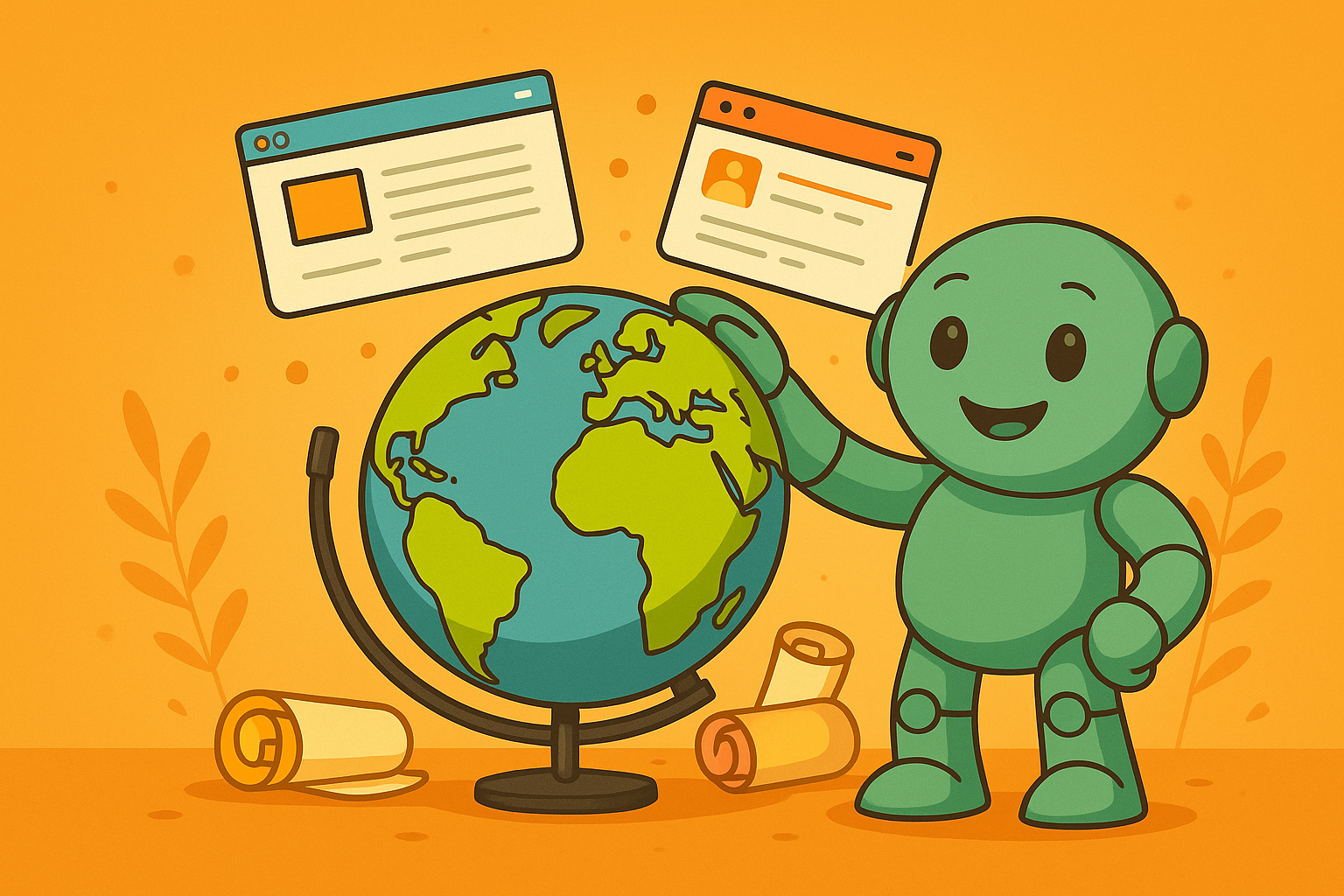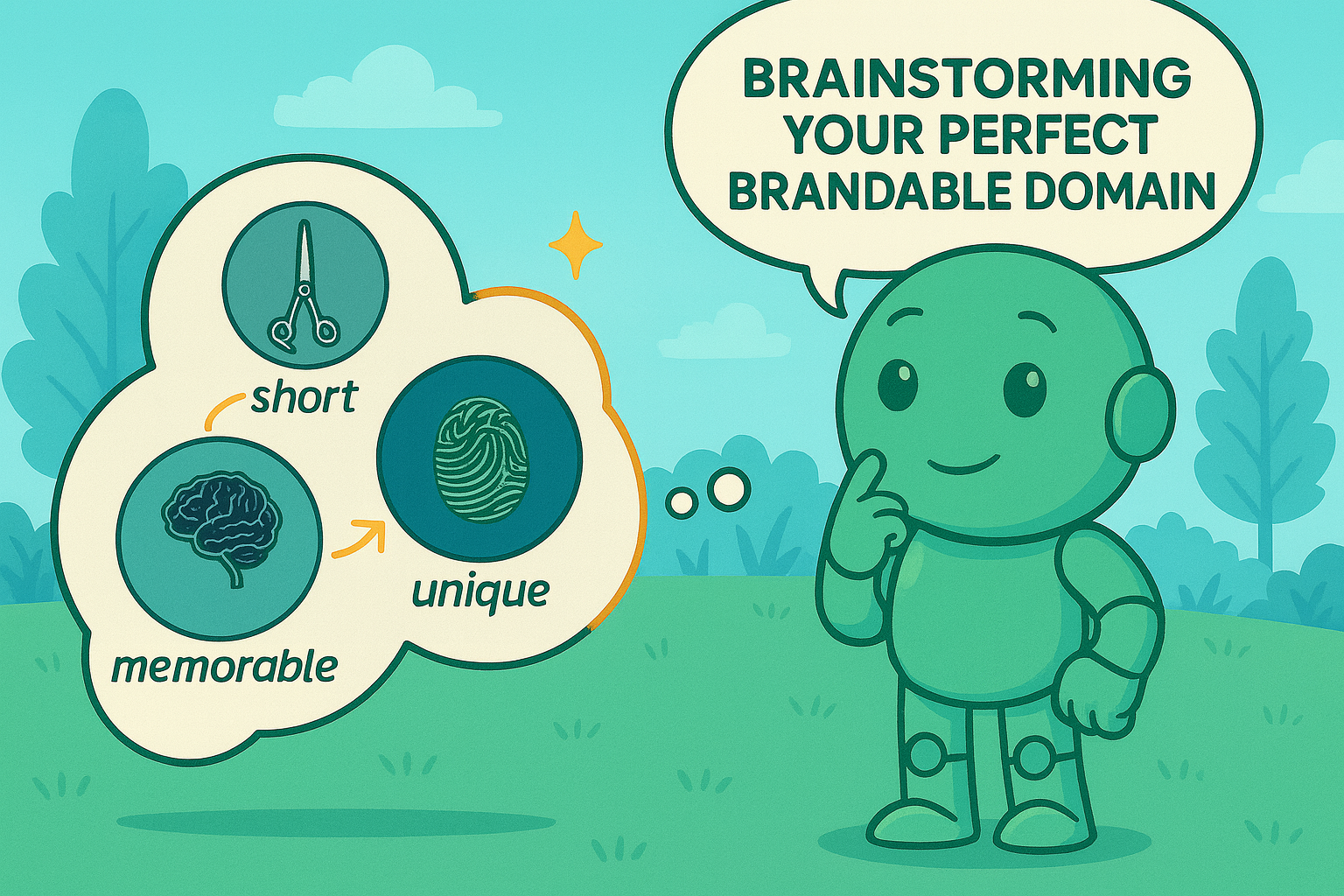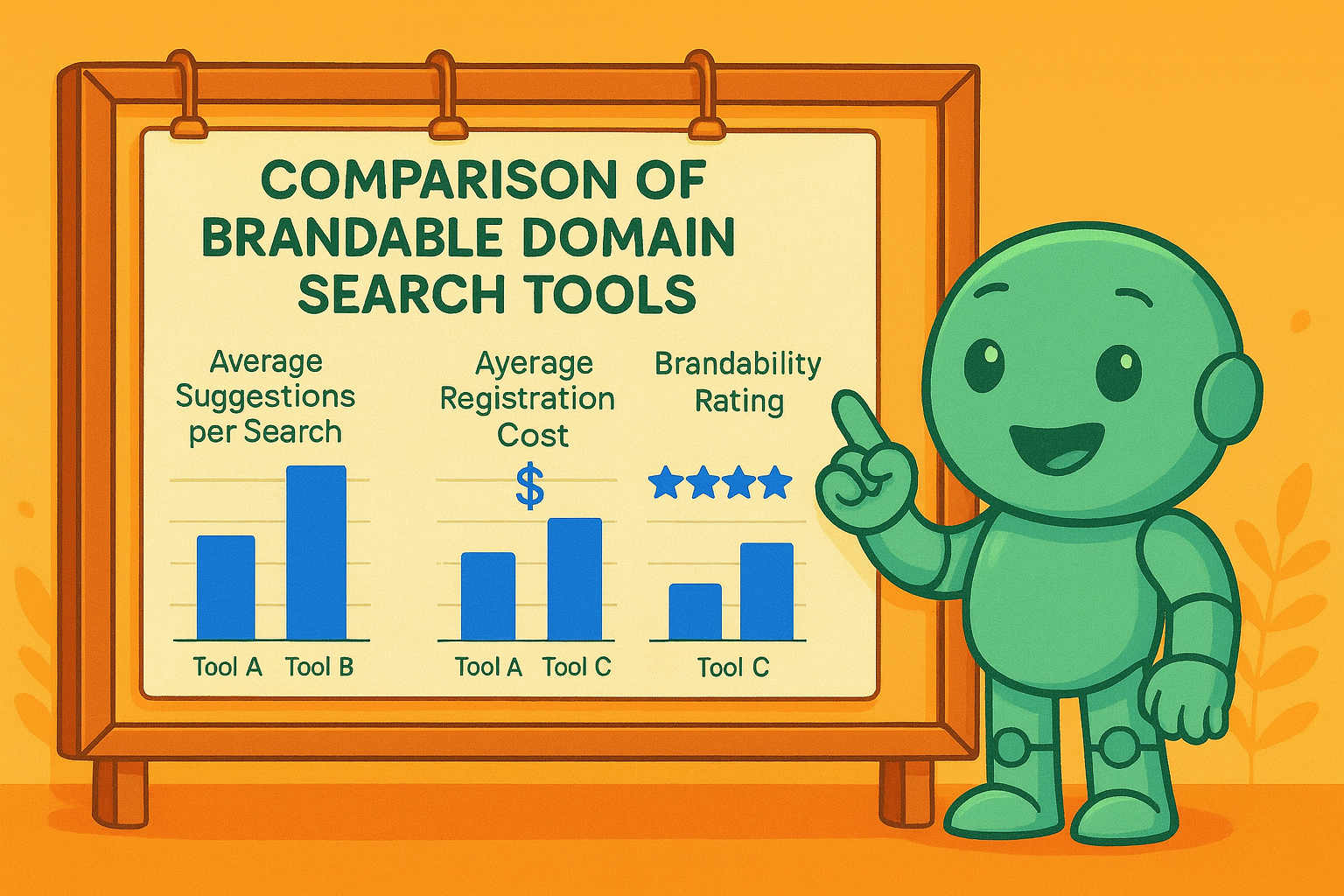Find Your Perfect Brandable Domain Names Today
Imagine your business is a shop in a massive, bustling city. A brandable domain name isn't just the street address; it's the iconic, eye-catching sign hanging out front. It’s what makes people remember your shop, not just the street it’s on. Think of names like 'Slack' or 'Canva'—they create a distinct identity that sticks, making them a cornerstone for growth and recognition.
What Makes a Domain Name Truly Brandable
At its heart, a brandable domain is all about the feeling it creates, not just the service it describes. It’s the difference between a name that sounds like a generic category (CheapLawnCare.com) and one that sounds like a real company (TruGreen.com). The first is literal and forgettable, but the second feels professional, trustworthy, and memorable.
The real power of a brandable name is its unique and catchy nature. These domains often get creative by inventing words (like 'Shopify'), cleverly combining two ideas ('Pinterest' from pin + interest), or using a word that sparks a particular emotion ('Calm'). They are built to be recalled easily, which makes word-of-mouth marketing infinitely more powerful.
The Contrast with Keyword Domains
For a long time, the prevailing wisdom was to cram keywords into a domain name. This strategy, known as an Exact Match Domain (EMD), led to names like VintageMoviePostersForSale.com. While it seems logical at first glance, this approach has some significant downsides:
- It’s Not Unique: These domains sound generic and easily get lost in a sea of similar-sounding competitors.
- It’s Not Flexible: What happens when your vintage poster shop wants to expand into modern art prints? The name
VintageMoviePostersForSale.comsuddenly becomes a major limitation. - It Hurts Credibility: Today’s customers are smart. A clunky, keyword-heavy domain can come across as spammy or less polished than a sleek, branded alternative.
A brandable domain, however, sets your business free from these limitations. It's built to grow with you, not hold you back.
The Foundation of a Strong Digital Identity
Brandable domains have become a critical piece of the puzzle for startups aiming for quick growth. The trend is clear: short, distinctive .com domains are highly valued because they are easier to remember and build trust in a crowded digital marketplace. It's a common misstep for new ventures to settle for a generic or weak domain, a mistake that highlights just how important it is to pick a name that truly stands out. You can discover more insights about brandable domain strategies and see the real impact they have on business.
The goal isn't just to secure a web address; it's to create a digital asset. A great brandable domain name is an investment in your company's future, enhancing every marketing dollar you spend by making your brand easier to find, remember, and share.
In the end, choosing a brandable name is a strategic move. It tells the world you’re building a serious brand, not just a temporary website. It's the first and most fundamental step in forging a lasting connection with your audience, transforming a simple URL into your most powerful marketing asset.
The Strategic Advantages of a Memorable Domain

A great brandable domain isn't just a clever marketing tactic; it's a foundational business asset that delivers real, measurable value. Its power comes from how it cements your brand identity, turning a simple web address into a genuine competitive edge. This isn't about looking good—it's about making smart choices that shape how customers see you and fuel your growth.
Think about how easily names like Asana or Trello come to mind. Now, imagine telling a friend about a site called ProjectManagementTaskSoftware.com. The first is sticky and easy to share, while the second is a mouthful that’s almost guaranteed to be forgotten or mistyped. A memorable domain makes word-of-mouth marketing feel completely natural.
Fostering Instant Trust and Credibility
Online, you have seconds to make a first impression, and your domain name is often the very first thing a potential customer sees. A professional, unique domain signals that you’re a serious business. It shows a level of polish and forethought that generic or keyword-stuffed domains just can't replicate.
Here's how a brandable domain helps build that crucial trust:
- Professionalism: A clean, catchy name looks sharp on business cards, email signatures, and ads.
- Memorability: When customers can easily remember your name, they can easily find their way back and recommend you to others.
- Perceived Authority: Names that sound like brands, not just descriptions, naturally carry more weight and feel more credible.
A domain riddled with double letters or hyphens, for instance, can immediately feel less trustworthy. These are often typo-traps that can send a frustrated user straight to a competitor or a dead-end error page. Getting this right from the start solidifies a professional image before a visitor even lands on your site.
A well-chosen brandable domain name acts as a silent ambassador for your business. It works around the clock to reinforce your brand's quality and legitimacy, building an unshakable sense of trust with every interaction.
This immediate credibility is a huge deal. It can be the one thing that convinces someone to click your link in the search results instead of the one right above or below it.
Unlocking Future Marketing Flexibility
One of the most powerful, yet often overlooked, benefits of brandable domain names is the strategic freedom they give you. A descriptive name like BostonDogWalking.com is incredibly limiting. What happens when the business decides to offer dog grooming, sell pet products, or expand to Cambridge? Suddenly, the domain becomes a cage, holding back growth.
On the other hand, a brandable name like Pawsitive.com or Wagz.com offers total flexibility. It allows the business to pivot, add new services, or enter new markets without being shackled to a specific offering or location. This is absolutely essential for long-term success.
This adaptability protects your brand equity. Instead of facing a costly and painful rebrand down the road, your domain grows right alongside your business. Choosing a name that leaves room for expansion is one of the smartest strategic moves you can make, ensuring your initial branding efforts keep paying off for years to come.
Brainstorming Your Perfect Brandable Domain

This is where the magic happens. Finding a great brandable domain isn't about getting lucky; it's a creative process, and when done right, it's how a powerful brand identity starts to take shape. Forget the generic advice. We're going to walk through the actual frameworks that successful companies use to find names that click with their audience.
The goal isn't just to find a name, but to create an asset. You need something memorable, easy to share, and that gives people the right gut feeling about your business. This journey doesn't start with a random list of words. It starts with getting crystal clear on your mission and who you're trying to reach.
Begin with Your Brand's Foundation
Before you even dream up a single name, you have to zoom out and define what your brand is all about. A truly great name grows directly from this core. To get started, ask yourself a few foundational questions.
- What is our core mission? Seriously, what problem do you solve? Don't think about features; think about the ultimate benefit you deliver to your customers.
- Who is our target audience? Are you talking to tech pros, busy parents, or freelance artists? The language and vibe of your name have to resonate with this specific group.
- What is our brand personality? Is your brand playful and fun? Serious and authoritative? Calm and reassuring? Your name is often the first glimpse people get of this personality.
Answering these questions gives you the raw material for brainstorming. More importantly, it gives you a filter to run every idea through, making sure every potential name actually supports your strategy.
Explore Proven Naming Frameworks
With your brand’s core defined, you can start generating ideas using techniques that consistently produce unique, memorable names. These aren't just theories; they're the methods behind some of the most recognizable brandable domain names out there.
Here are three effective approaches to get the ideas flowing:
-
The Invented Word: This is all about creating a completely new word. It’s a fantastic way to guarantee your name is one-of-a-kind and carries no baggage. Think of names like Shopify or Verizon. The trick is to make the word sound plausible and be easy to say out loud.
-
The Compound Word: This classic technique blends two relevant words into a single, cohesive name. Pinterest (pin + interest) and Facebook (face + book) are perfect examples. It’s a smart way to hint at what your business does without being boringly literal.
-
The Evocative Word: This approach uses a real word to suggest a feeling, benefit, or experience tied to your brand. Calm is brilliant for a meditation app, and Nest instantly evokes a sense of home and security for a smart home company.
A brandable name doesn't just describe what you do; it tells a story. Whether you invent a word, blend two concepts, or evoke a feeling, the strongest names create an immediate emotional or intellectual connection with the audience.
Critical Pitfalls to Avoid in Brainstorming
As you build your list of potential names, knowing what not to do is just as important. Some common mistakes can create confusion, hurt your credibility, or simply make it harder for customers to find you.
- Avoid Hyphens: They often come across as spammy or low-rent. Hyphens also create a "typo trap"—if a customer forgets it, they could end up on a competitor's site. It’s an unnecessary hurdle.
- Steer Clear of Numbers: Numbers in a domain name breed confusion. When you say "Shoes4U.com" out loud, people are left wondering if they should type "ShoesForU.com" or "ShoesFourU.com." Stick to letters for clarity.
- Dodge Awkward or Difficult Spelling: If you have to spell out your domain every time you say it, it isn't brandable. The best names are intuitive. People should be able to type them from memory after hearing them once.
- Don't Use Double Letters: A name like
Businesssolutions.comis a typo waiting to happen (Businesolutions.com). Avoiding doubled letters makes your domain more typo-proof and a whole lot easier to type correctly.
By sidestepping these common blunders, you can ensure your final contenders are strong, professional, and built for easy recall. This process, blending strategic thinking with proven frameworks, will leave you with a powerful shortlist of brandable names ready for the final test.
Essential Tools for Finding Your Domain
So, you’ve brainstormed a solid list of potential names for your brand. That’s the fun part. Now comes the moment of truth: seeing which of those brilliant ideas are actually available to register.
This is where the right tools are an absolute game-changer. They can turn what is often a frustrating dead-end search into a creative and productive process. The key is knowing what kind of tools to use and when.
The demand for good domain names is staggering. As of the first quarter of this year, there were roughly 368.4 million domain registrations across all top-level domains. That's a 1.7% increase from the year before, which tells you just how crowded the digital space is. Finding an available, high-quality name requires a bit of strategy.
AI-Powered Domain Generators
Ever feel that gut-punch of disappointment when your perfect domain name is already taken? We've all been there. This is precisely where AI-powered domain generators come in handy.
These aren't just simple search tools that spit back "available" or "taken." Think of them as creative partners. You feed them your core keywords or ideas, and they generate hundreds of unique alternatives—many of which you'd never think of on your own. They cleverly blend your input with related words, prefixes, and suffixes to create catchy, memorable options.
Instead of getting stuck, you can quickly pivot and discover fresh possibilities. If you want to dive deeper into this, our guide on the best business name generators offers even more great resources.

As you can see, different tools have different strengths. Some aim for sheer volume, giving you tons of ideas to sift through, while others focus on curating more brandable, premium-sounding names right from the start.
Comparison of Top Domain Name Generators
To help you find the best tool for your brainstorming needs, we've compared some of the most popular AI-powered domain name generators. This table breaks down their features, ease of use, and the quality of ideas they typically produce, helping you choose the right creative partner for your project.
| Tool Name | Key Features | Best For | Pricing Model |
|---|---|---|---|
| Namecheap | Integrated search and registration, "Beast Mode" for bulk checks, AI suggestions. | Finding affordable, unregistered domains and exploring many variations quickly. | Free generator, standard domain registration fees. |
| Shopify | AI-powered suggestions, focus on e-commerce and .com availability. | Entrepreneurs starting an online store who need a simple, brand-focused name. | Free to use. |
| Bust a Name | Combines words, checks for available social handles, saves domain ideas. | Creative brainstorming when your initial ideas are taken and you need to mix and match words. | Free to use. |
| Panabee | Fun, visual approach; suggests names based on phonemes, syllables, and related terms. | Sparking creative, out-of-the-box ideas when you feel stuck in a naming rut. | Free to use. |
Ultimately, the best generator depends on your specific goals. For straightforward, budget-friendly searching, a tool like Namecheap is excellent. For more abstract and creative inspiration, Panabee or Bust a Name might be a better fit.
Domain Registrars vs. Aftermarketplaces
When you start your search, you'll run into two main types of platforms. Understanding the difference is crucial for managing your budget and expectations.
-
Domain Registrars: These are the places you go to register a brand-new, never-before-owned domain. Think of companies like Namecheap or GoDaddy. If your desired name is available, you can typically register it for an annual fee of around $10 to $20. This is the most direct and affordable route.
-
Aftermarket Marketplaces: This is where you buy domains that someone else already owns. Platforms like Sedo or Afternic are essentially brokerage houses for previously registered domains. These "premium" names are often short, memorable, and valuable, but the price tag reflects that, ranging from hundreds to many thousands of dollars.
Your budget is the deciding factor here. If you're working with limited funds, your best bet is to find an unregistered name through a registrar. If you have the capital and your heart is set on a premium, top-tier name, then exploring the aftermarket could be a powerful investment in your brand's future.
So, you’ve brainstormed a list of potential brandable domain names. What now? The next step—picking the winner—is where the real work begins. This isn't a decision to take lightly; your domain name will become a cornerstone of your brand identity for years to come. A methodical evaluation process is your best friend here, helping you move past gut feelings and make a strategic choice that sets you up for success.
Think of it like test-driving a car. A name might look fantastic on paper, but you need to see how it actually performs. Is it easy to handle when spoken? Can people find it without getting lost? A structured approach ensures you drive away with the domain that will go the distance.
The Core Evaluation Checklist
Before you get bogged down in technical details, run your top contenders through this simple but incredibly powerful checklist. It's designed to test the practical, real-world usability of each name. A truly great brandable domain should feel effortless.
- Is it easy to remember? The best names are sticky. A potential customer should hear it once and be able to recall it later without a second thought.
- Is it easy to say? Say the name out loud—seriously. Does it roll off the tongue, or is it a clunky mouthful? If it's hard for you to pronounce, it'll be impossible for others to share via word-of-mouth.
- Is it simple to type? Avoid clever but complex spellings, hyphens, or double letters that are just begging to be mistyped. A name like
StellarSolutions.comis far more prone to errors than something clean and simple. - Does it align with your brand? The name needs to match the vibe you're going for. A playful, quirky name probably isn't the right fit for a serious financial consultancy, for instance.
If a name stumbles on any of these points, consider it a major red flag. Trying to fix a confusing or forgettable domain down the road is a painful and expensive undertaking.
Performing Essential Due Diligence
Once you've whittled your list down to a few strong candidates, it’s time for some critical background checks. This part is all about protecting your brand from future legal headaches and a sketchy past. Skipping this step is a risk you simply can't afford to take.
First, check for existing trademarks. A quick search on the U.S. Patent and Trademark Office (USPTO) website can tell you if another company already has legal rights to a similar name. Using a trademarked name, even by accident, can land you in a world of expensive legal trouble.
Second, research the domain's history. Use a tool like the Wayback Machine to see what, if anything, used to be on that domain. You need to make sure it wasn't previously used for spam, scams, or other shady activities that could have gotten it penalized by search engines.
A clean history is non-negotiable. Inheriting a domain with a spammy past is like buying a house with hidden structural damage—it creates major problems that are hard and expensive to fix.
The Importance of the .com Extension
The global domain market is absolutely booming. Projections show it could swell to 459.9 million registrations by 2030, a huge leap from the current 378.6 million. This explosive growth is driven by a constant stream of new online businesses, making the fight for prime digital real estate fiercer than ever. For a deeper dive into this trend, you can explore the full report on domain name industry growth.
In this competitive arena, the .com extension remains the undisputed king. It is, by far, the most recognized and trusted top-level domain (TLD) on the planet. While alternatives like .io or .ai have gained traction in tech circles, .com still carries the most weight and authority with the general public.
If your perfect name is already taken as a .com, it’s almost always better to brainstorm a new one rather than settling for a less familiar extension. If you're stuck for ideas, our guide on using a brand name generator can help you create new options.
Frequently Asked Questions
Choosing a brandable domain name can feel like a high-stakes decision, and it’s natural to have questions. Let's walk through some of the most common ones I hear from entrepreneurs to help you move forward with confidence.
Is a .com Extension Still Important for a Brandable Domain?
Absolutely. For most businesses, the .com extension is still king. It’s what customers instinctively type, and it carries an unmatched level of trust and authority. Think of it as the default setting in people's minds.
While newer extensions like .io or .ai have found a home in the tech world, they remain niche. If you're building a broad, credible brand, a .com is almost always the safest and most valuable bet. It's often smarter to find a new brandable name with an available .com than to settle for a less-familiar extension with your first-choice name.
How Much Should I Expect to Pay for a Good Domain Name?
This is where the path splits. If you find a great brandable name that no one has registered yet, you're in luck. You can typically secure it for a standard registration fee, usually around $10 to $20 a year. This is the ideal scenario for startups and budget-conscious founders.
The other path is the domain aftermarket. If your desired name is already owned, it becomes a "premium" domain. Prices here can be all over the map, starting from a few hundred dollars and climbing into the tens of thousands—or even more for truly top-tier names.
What Is the Difference Between a Brandable and a Keyword Domain?
This is a crucial distinction. A brandable domain is a unique, inventive name that doesn't just describe what you do. Think of giants like 'Google' or 'Etsy'. Their names are blank slates that became powerful brands.
On the other hand, a keyword domain (or exact-match domain) spells out a function, like CheapCarInsuranceQuotes.com. These were once popular for SEO but now often come across as generic and untrustworthy. More importantly, they severely limit your ability to grow beyond that one specific service.
A brandable domain gives you room to build an identity that can evolve with your business. A keyword domain paints you into a corner.
Can I Change My Domain Name Later?
You can, but I strongly advise against it if you can avoid it. Rebranding and migrating your website to a new domain is a messy, expensive, and risky affair. It means moving all your content, meticulously setting up redirects to salvage your hard-earned SEO, and updating every single marketing asset you've ever created.
Even when done perfectly, a domain change can lead to temporary nosedives in search rankings and cause major confusion for your loyal customers. It’s far better to invest the time now to get it right from the start. To sidestep some common errors, check out these three typical mistakes when naming a new company.














